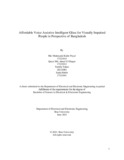| dc.contributor.advisor | Azad, A. K. M. Abdul Malek | |
| dc.contributor.author | Peyal, Md. Mahmudul Kabir | |
| dc.contributor.author | Haque, Quazi Md. Ahnaf Ul | |
| dc.contributor.author | Tahiat, Tashfia | |
| dc.contributor.author | Habib, Sadia | |
| dc.date.accessioned | 2021-09-26T11:38:30Z | |
| dc.date.available | 2021-09-26T11:38:30Z | |
| dc.date.copyright | 2021 | |
| dc.date.issued | 2021-06 | |
| dc.identifier.other | ID 17321014 | |
| dc.identifier.other | ID 17221012 | |
| dc.identifier.other | ID 20121083 | |
| dc.identifier.other | ID 17321041 | |
| dc.identifier.uri | http://hdl.handle.net/10361/15054 | |
| dc.description | This thesis is submitted in partial fulfillment of the requirements for the degree of Bachelor of Science in Electrical and Electronic Engineering, 2021. | en_US |
| dc.description | Cataloged from PDF version of thesis. | |
| dc.description | Includes bibliographical references (pages 84-88). | |
| dc.description.abstract | This paper describes design of affordable intelligent glass for visually impaired. A significant number of people are visually impaired or blind among the total population of Bangladesh. Most
of them relied on others directly or indirectly which makes their life challenging. In terms of
academic and social perspective, they lag behind from their fellow mates. To help these people
and lead a better life, artificial intelligent glasses can play a vital role in today’s world. Through
this smart glass visual system will convert into an audible system in real time by using a single
board computer. Convolutional neural network has been introduced to help visually impaired
people to classify objects. Moreover, text recognition will be available for recognizing and reading
Bangla as well as English text. With the help of voice command users might be able to control
electrical gadgets and be able to communicate with caregivers through mobile app. | en_US |
| dc.description.statementofresponsibility | Quazi Md. Ahnaf Ul Haque | |
| dc.description.statementofresponsibility | Md.Mahmudul Kabir Peyal | |
| dc.description.statementofresponsibility | Tashfia Tahiat | |
| dc.description.statementofresponsibility | Sadia Habib | |
| dc.format.extent | 131 pages | |
| dc.language.iso | en | en_US |
| dc.publisher | Brac University | en_US |
| dc.rights | Brac University theses are protected by copyright. They may be viewed from this source for any purpose, but reproduction or distribution in any format is prohibited without written permission. | |
| dc.subject | Smart glass | en_US |
| dc.subject | Raspberry pi 4 | en_US |
| dc.subject | Deep learning | en_US |
| dc.subject | Image classification | en_US |
| dc.subject | Speech processing | en_US |
| dc.subject | Convolutional neural network | en_US |
| dc.subject | Optical character recognition | en_US |
| dc.subject | Sensor | en_US |
| dc.subject | App | en_US |
| dc.subject.lcsh | Deep learning | |
| dc.title | Affordable voice assistive intelligent glass for visually impaired people in perspective of Bangladesh | en_US |
| dc.type | Thesis | en_US |
| dc.contributor.department | Department of Electrical and Electronic Engineering, Brac University | |
| dc.description.degree | B. Electrical and Electronic Engineering | |

